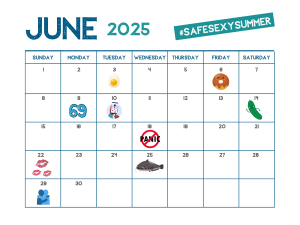
Anal Sex and STIs
Anal sex may have once been thought of more taboo than other sexual behaviors, but today we know it’s a perfectly normal way to find sexual pleasure.
Would be easier if we didn’t have to be naked when we do! Sexual health experts Martha Kempner and Logan Levkoff help you learn how to “own your awkwardness” and get the care you need.
If you’re a sexually active person— or even if you’re not right now—you probably have questions about your sexual health. Like, should I be tested for STIs? Which ones? Or what are my options for preventing pregnancy? You also might have questions about your libido and why it’s so low…or so high, and whether that’s normal. Or why sex is painful, or getting an erection is so difficult. It’s not always easy to bring these topics up, and it may not be clear exactly what questions you should be asking about your sexual health.
So how do you overcome your own hesitancy or embarrassment and start that conversation with your healthcare provider? That’s what we’re talking about today on this episode of ASHA’s Sex+Health podcast. To help us out with this conversation we have two sexual health experts—Martha Kempner and Logan Levkoff.
You can watch the conversation above or you can listen below. This episode is part of ASHA’s Sex+Health podcast, which features interviews with medical professionals and experts in the field of sexuality with the goal of helping people take charge of their sexual health and understand its importance to overall well being.

Anal sex may have once been thought of more taboo than other sexual behaviors, but today we know it’s a perfectly normal way to find sexual pleasure.

It’s time to celebrate the start of summer! June is filled with national observances to help you start the summer off right. We’re here to help make June the start of a #safesexysummer.

Today there are a lot of experts offering sexual health information and advice on websites and social media, but in the 1980s it seemed like everyone was listening to just one: Dr. Ruth Westheimer.

STIs aren’t about age, they’re about sexual behavior. Older people are having sex, and they need to be thinking about sexually transmitted infections.

In this essay, certified sexuality counselor Evelyn Resh reflects on how our sex lives and perceptions of pleasure change over time.

Featuring interviews with medical professionals and experts in the field of sexuality, ASHA’s Sex+Health podcast aims to offer information and resources to with the goal of helping people take charge of their sexual health.
ASHA believes that all people have the right to the information and services that will help them to have optimum sexual health. We envision a time when stigma is no longer associated with sexual health and our nation is united in its belief that sexuality is a normal, healthy, and positive aspect of human life.
ABOUT
GET INVOLVED
ASHA WEBSITES
GET HELP
© 2025 American Sexual Health Association